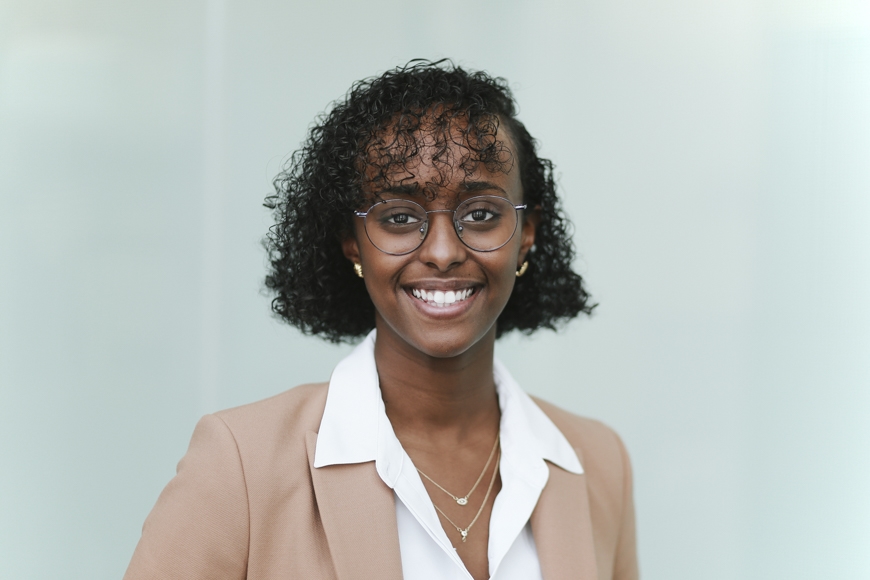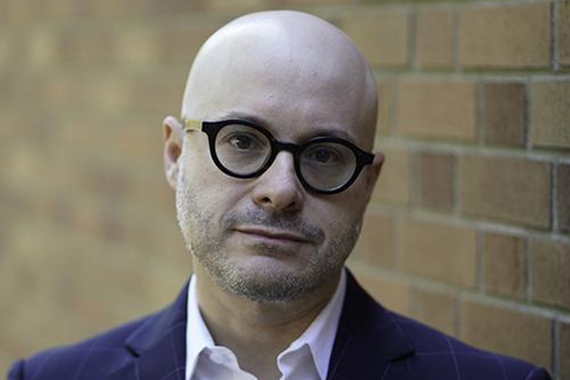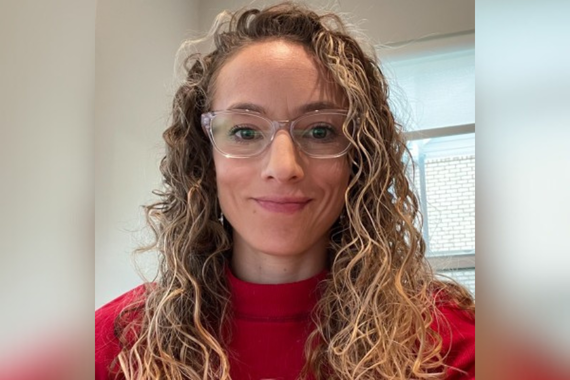Philsan Isaak: A Brilliant Undergrad
“She is brilliant and she was—and is—a leader in class, despite being the youngest in the room,” said Professor Lisa Hilbink, noting it was difficult to come up with enough superlatives to describe Philsan Isaak, an undergraduate political science major.
An Early Start
Growing up in Blaine and attending high school at Spring Lake Park, Isaak was able to concurrently enroll at the University of Minnesota for her final two years of high school through the Postsecondary Enrollment Options (PSEO) program. Isaak took the online version of Law and (In)Justice in Latin America with Professor Hilbink through the PSEO program in spring 2021.
A month into the course, Philsan met with Professor Hilbink on Zoom to discuss a presentation she was preparing for class. “As we were chatting, Philsan told me she was a PSEO student and was only 17 years old. I practically had to lift my jaw off the floor. The student who had distinguished herself with her spot-on answers to questions and remarkable insights into the material, as well as serving as a confident and competent group leader, was also the youngest member of the class by several years!¨
Before taking Professor Hilbink’s course, Isaak focused on studying American politics with an eye towards law school. “If I could say that any one course put me on the PoliSci bandwagon,” Isaak says, “it was Supreme Court Politics with Professor Tim Johnson. The course content and Professor Johnson’s teaching style all wrapped up in one was extraordinary.” The course content was legally focused, highly analytical, and centered on the United States. “It was just the perfect recipe and ultimately had a large part to play in the academic path I chose to take.”
Doing a small part to push the world towards a better future
The rigorous academic content in the Department of Political Science is providing the base for Isaak to launch into law school. As a lawyer, Isaak wants to make the world a better place.
“I’ve always been a firm believer in the idea that progress happens incrementally,” Isaak explains, “and through many people doing their small part to push the world towards a better future. Being a lawyer feels like the most natural and ‘me’ way of doing that. By offering voices for those who have been stripped of their own, and challenging the assembly-line method of justice delivery currently in practice, I feel that I would be doing my part in achieving positive progress.”
The department has prepared Isaak for law school and beyond by “strengthening my analytical skills and helping me see all the systemic issues that plague our nation more holistically.”
Even for students focusing on the American context, the Department of Political Science offers the opportunity to holistically approach any branch of the discipline. “Taking Latin American Politics and Law and (In)Justice in Latin America with Professor Hilbink served primarily to widen my scope of political knowledge,” Isaak points out. “Taking her classes allowed me to see political contexts outside what I had previously known, and understand how different situations and starting positions could impact political outcomes.” Internationally focused courses allow students to build a theoretical framework for assessing topics that one might think only resonate domestically.
The challenges and opportunities of studying in a pandemic
Choosing the University of Minnesota was an easy choice for Isaak. “UMN had the largest student body, the best research resources, and the most course options. UMN offered everything that I was looking for in a school.” After building relationships with professors as a PSEO student, Isaak was even able to line up a research position with a sociology professor for her first semester as an official undergraduate student.
But PSEO and the first semester as an undergraduate weren't without difficulties. Like the majority of students, Isaak needed to navigate online courses and the pandemic. “Moving to online classes was certainly a tough transition,” Isaak admits, “but I think the professors I had in those remote semesters did a great job of engaging students during class time.”
Building community and bonding with fellow classmates was important for Isaak during remote learning. “We were all navigating new circumstances and expectations,” Isaak says, “and although we didn't have face-to-face interactions, we could all bond over shared difficulties.” Whether it was the latest Zoom update, glitchy Wi-Fi, or coordinating meetings with participants in different time zones, the struggles brought Isaak closer to her fellow students. In addition, the added flexibility of remote learning allowed Isaak to pick up more hobbies and volunteer with her local community more than she was able to when school was still in-person.
Isaak is glad to be back in person though, if only because she has been spending a lot of time at the University’s rock climbing gym. “The community there is very welcoming and energetic,” Isaak says. Plus, “in-person courses have made it easier to connect with other students and professors, and make in-class discussions feel more inclusive.” While there was some anxiety about returning to in-person learning and masks becoming uncomfortable after a long day, Isaak says, “I try to remind myself that this is just the cost of being back in person on such a vibrant campus. There’s no question in my mind that it’s worth it!”
More praise from Political Science faculty
"Philsan is the epitome of a liberal arts student,” according to Professor Timothy R. Johnson, “she thinks critically but with an open mind, she is a beautiful writer, and she has a keen eye for sussing out logical problems. Philsan is clearly in the top 1% of students I have ever taught (of more than 7500 in my career). In my constitutional law courses, she asked some of the most insightful questions I have fielded about some of the most complex and salient legal issues of the day."


